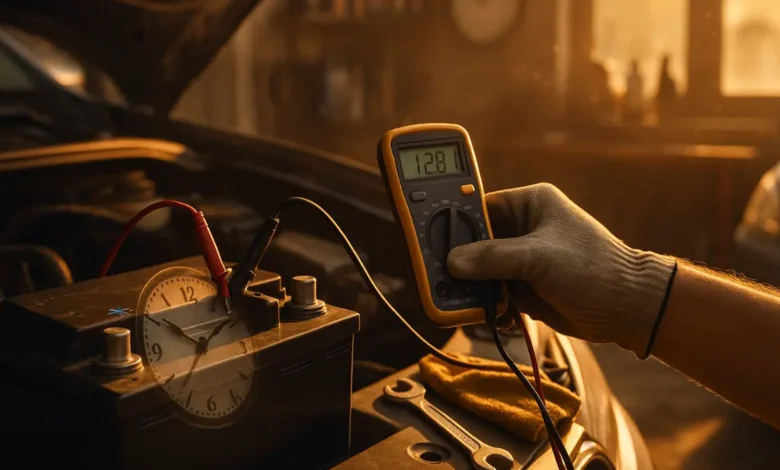How Long Do Car Batteries Last: Expert Insights on Lifespan, Maintenance, and Performance

Discover how long car batteries last, what affects their lifespan, and expert maintenance tips to make your battery last longer. Learn signs of a weak battery and ways to improve performance.
Understanding How Long Car Batteries Last
When people ask how long do car batteries last, the answer depends on more than just time — it’s a combination of climate, driving habits, and maintenance. Generally, car batteries last between three to five years, but under perfect conditions, a high-quality car battery might even last six or seven years. However, that’s rare in real-world driving, as most car batteries experience varying temperatures and usage patterns that shorten their overall lifespan.
Car batteries are not designed to last forever. Over time, chemical reactions inside the battery degrade, leading to weaker charge retention. The more your vehicle’s electrical system relies on it — especially with modern accessories and sensors — the harder the battery works. That’s why knowing how long car batteries last isn’t just trivia; it’s essential to prevent unexpected breakdowns.
Factors That Influence How Long Car Batteries Last
Several factors determine how long car batteries last. Understanding them can help you extend your battery’s lifespan and avoid premature replacements.
Climate plays a huge role. In hotter regions, batteries deteriorate faster because heat accelerates fluid evaporation and chemical wear. In contrast, freezing climates can thicken the battery’s internal fluids, making it harder to deliver consistent power during startup.
Driving habits also affect how long car batteries last. Short trips don’t give the alternator enough time to fully recharge the battery. If you mostly take quick drives, your battery constantly operates below full charge — which can shorten its life dramatically.
How Temperature Affects Car Battery Lifespan
The environment around your vehicle directly affects how long car batteries last. High temperatures accelerate chemical reactions inside the battery, which might sound good for performance but actually increases wear and fluid loss. The result? A shorter overall lifespan.
In cold weather, the opposite problem occurs. The battery struggles to produce enough current to start the engine because chemical reactions slow down. This is why a weak battery in winter often fails without warning. Keeping your car in a garage or using an insulated cover can help regulate temperature extremes.
Signs That Your Car Battery Is Dying
Knowing the warning signs can save you from being stranded. A dying battery often shows subtle symptoms long before it fails completely. Understanding these signs helps you decide when to replace your battery — before it becomes a problem.
You might notice your engine cranking slowly, dashboard lights dimming, or the check battery light glowing. Sometimes, the radio or power windows may work erratically. If your headlights flicker when idling, that’s another clue your car battery may not be holding charge effectively. When you recognize these patterns, you’ll better understand how long your car battery might last before needing replacement.
How to Test Car Battery Health
Testing your battery regularly gives you a clear idea of how long car batteries last in your specific vehicle. You can use a digital multimeter to check voltage levels; a fully charged battery should read around 12.6 volts when the car is off and about 13.7 to 14.7 volts when running.
Many auto shops offer free battery testing, which measures not only voltage but also cold-cranking amps — a key indicator of your battery’s strength in winter. Regular testing can reveal internal degradation early, helping you plan timely replacements and avoid sudden failure.
Maintenance Tips to Make Car Batteries Last Longer
The key to making car batteries last longer lies in consistent maintenance. Simple steps can significantly extend lifespan and performance.
Keep the battery terminals clean and corrosion-free. White or bluish residue around terminals can prevent proper current flow. Clean it gently using a brush and baking soda solution. Also, ensure that the battery is securely mounted; vibration damages internal components over time.
Driving regularly helps too. Long drives allow the alternator to recharge the battery fully. If you leave your car parked for long periods, consider using a battery maintainer or trickle charger to keep it healthy. Small habits like these add years to how long your car battery lasts.
Different Types of Car Batteries and Their Lifespans
Not all car batteries are created equal. The type of battery installed in your vehicle can influence how long it lasts. Here’s a quick overview:
| Battery Type | Average Lifespan | Key Features |
|---|---|---|
| Lead-acid (Standard) | 3–5 years | Common, affordable, requires occasional maintenance |
| AGM (Absorbent Glass Mat) | 4–7 years | More resistant to vibration, ideal for high-performance vehicles |
| Gel Cell | 5–6 years | Sealed, maintenance-free, performs well in extreme climates |
| Lithium-Ion | 8–10 years | Lightweight, used in hybrids and EVs, longer-lasting |
Understanding which type you have helps you estimate how long your car battery will last — and whether an upgrade might be worth it in the long run.
Impact of Driving Patterns on Battery Life
How long car batteries last often depends on your driving routine. Frequent highway trips help keep the battery charged, while short city drives can drain it faster. The alternator recharges the battery only when the engine runs for a reasonable duration — usually more than 20 minutes.
If you leave your vehicle unused for weeks, the battery slowly discharges, even if everything is turned off. Modern cars have parasitic drains from onboard electronics like alarms and memory systems. To avoid that, disconnect the battery or use a maintainer when storing your car.
The Role of Alternator and Charging System
The alternator is your battery’s best friend. It recharges the battery while you drive, ensuring that electrical components get steady power. But when the alternator fails, even a new battery won’t last long. In such cases, people often mistake a charging issue for a weak battery.
To truly know how long car batteries last, make sure your charging system is working properly. A mechanic can test alternator voltage output. If it’s below 13.5 volts, your battery might never reach full charge, cutting its lifespan drastically.
How to Choose a Car Battery That Lasts Longer
If you’re replacing your battery, select one designed for longevity. Choose brands known for consistent performance and strong warranties. The cold-cranking amps (CCA) rating should match your climate — higher CCAs are better for cold areas.
Also, look for reserve capacity (RC) ratings. A higher RC means your battery can power electrical systems longer if the alternator fails. Combined with good maintenance habits, a properly rated battery ensures a long, reliable lifespan.
How Storage Conditions Affect Battery Longevity
Proper storage extends battery life dramatically. If you store your vehicle, keep the battery in a cool, dry place. Disconnect it from the terminals to prevent small power drains. Using a smart charger can maintain a steady charge without overcharging — something essential if you want to maximize how long your car battery lasts.
Avoid storing the battery directly on concrete floors, as moisture can seep in and affect performance over time. Always use a non-conductive base, such as wood or rubber, for longer storage.
When to Replace a Car Battery
Even the best-maintained car batteries reach their limit. Most experts recommend testing your battery annually after it’s three years old. When you notice symptoms like sluggish starts or repeated jump-starts, it’s time to consider a replacement.
It’s better to replace a weak battery before it fails. That’s not only safer but also saves you from towing costs or being stranded in inconvenient places. Knowing when to replace it is key to managing how long your car battery lasts in the long term.
Common Myths About Car Battery Lifespan
There are plenty of myths about how long car batteries last. One popular belief is that idling the engine fully recharges the battery — it doesn’t. Alternators generate more power when driving, not idling.
Another myth is that “maintenance-free” means no maintenance at all. In reality, even sealed batteries benefit from occasional checks for corrosion or loose terminals. Understanding these misconceptions helps you take smarter care of your battery and extend its usable life.
Environmental Effects on Battery Longevity
Your surroundings affect how long car batteries last more than most drivers realize. Humidity, dust, and poor ventilation can lead to premature failure. Vehicles driven in coastal or high-salt environments often experience faster corrosion of terminals.
To combat this, apply a thin layer of petroleum jelly or terminal protectant spray on the connectors. It acts as a barrier against corrosion and moisture, improving both performance and longevity.
Eco-Friendly Disposal of Old Car Batteries
When your battery finally reaches the end of its life, proper disposal is crucial. Car batteries contain lead and acid, both hazardous materials that require responsible recycling. Most auto shops or recycling centers accept used batteries.
Recycling old units not only helps the environment but also recovers valuable materials. This sustainable approach ensures that the discussion about how long car batteries last also includes what happens after they die.
Expert Tips for Maximizing Battery Performance
Experts agree that consistency is key. Check your battery terminals monthly, ensure tight connections, and avoid deep discharges. Using headlights or audio systems for long periods without the engine running strains the battery unnecessarily.
Regularly inspect the charging voltage, and don’t ignore warning lights. When your car’s electrical system is balanced and clean, the battery naturally lasts longer.
Expert Quote:
“Your car battery’s lifespan is like your health — it’s not just about age, but how well you maintain it.”
Seasonal Maintenance for Better Battery Health
Changing seasons can drastically affect how long car batteries last. Before winter, test your battery and inspect cables for wear. In summer, ensure ventilation around the battery area to prevent overheating.
A little seasonal maintenance goes a long way. For example, parking in shade during summer or insulating the battery in winter can add months — even years — to its functional lifespan.
Car Battery Warranty and Replacement Policy
Always check the warranty when buying a new car battery. A good warranty usually covers three to five years, but terms differ by brand. Understanding warranty conditions helps you estimate how long your car battery should last — and what’s covered if it doesn’t.
Keep receipts and warranty cards safe. Some manufacturers offer prorated replacements, reducing the cost if your battery fails prematurely.
The Future of Car Battery Technology
Battery technology continues to evolve. Modern vehicles are seeing longer-lasting, more efficient designs. AGM and lithium-ion batteries are leading the way, offering higher capacity and lower self-discharge rates. These innovations may redefine how long car batteries last in the coming decade.
Electric vehicles take this even further, with complex thermal management systems that maintain ideal operating conditions — helping extend battery life well beyond traditional expectations.
Frequently Asked Questions
How long do car batteries last on average?
Most car batteries last between three to five years, depending on climate, driving style, and maintenance. Premium types like AGM or lithium-ion can last longer under proper care.
Can a car battery last 10 years?
While it’s rare, some high-quality lithium-ion or AGM batteries can reach close to 10 years with ideal conditions and consistent maintenance.
Does driving short distances reduce battery life?
Yes. Frequent short trips prevent the alternator from fully recharging the battery, leading to shorter life over time.
How do I know when my car battery needs replacement?
Watch for slow engine cranks, dim lights, or electrical issues. If your battery is over three years old, have it tested regularly.
Can a dead car battery be recharged?
Sometimes. If it’s just discharged, jump-starting and driving may recharge it. But if it’s old or damaged, replacement is usually the best option.
Conclusion
So, how long do car batteries last? On average, about three to five years — but that’s just the baseline. With smart maintenance, proper charging, and mindful driving, you can easily stretch that to six or seven years. The key lies in regular care: clean terminals, consistent testing, and understanding your car’s needs.
A healthy car battery means a reliable ride. Treat it well, and it’ll keep your engine roaring for years.





